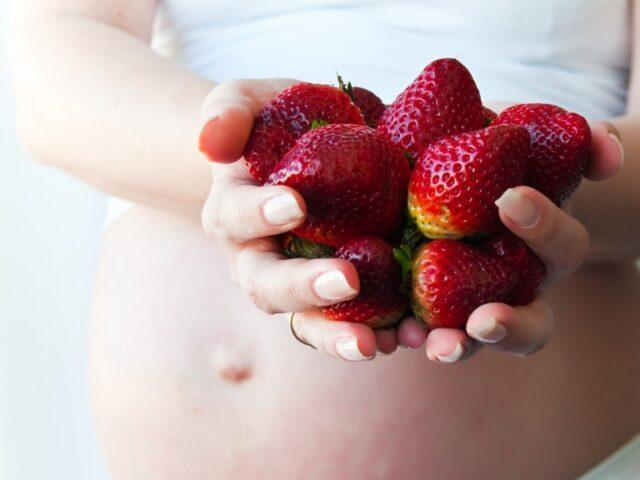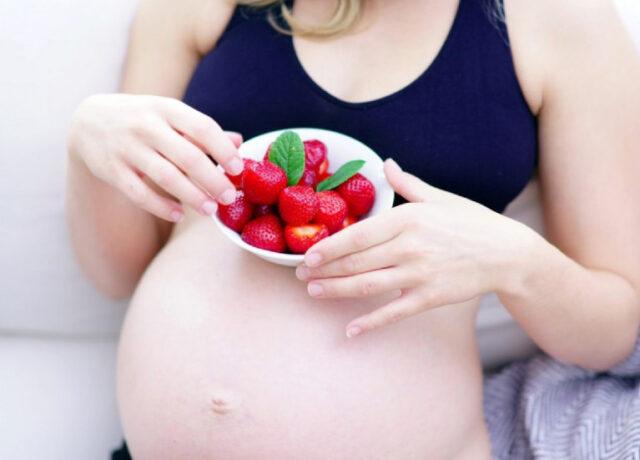Content
Strawberries are a delicious and aromatic berry loved by adults and children. Its value lies in the fact that it contains many useful components for human health. But there is an opinion that you should not eat strawberries during pregnancy. After all, this berry can cause allergies, and thereby harm the development of the child. Therefore, you should figure out whether you can strawberries for pregnant women or it is better to refrain from them during the period of gestation. And if this product is allowed to be consumed, then in what quantity, depending on the trimester.

Strawberry is superior to citrus in vitamin C
Is it possible for pregnant women
This berry can be both beneficial and harmful during pregnancy. In the first case, this is due to its rich chemical composition, which makes it possible to compensate for the arising deficit of the necessary components for the woman's body and the development of the baby.
In the second case, the danger lies in the high content of oxalic acid, which interferes with the absorption of calcium by the woman's body, which can complicate the course of pregnancy. Therefore, experts recommend consuming these fruits along with dairy products. Oxalic acid can also cause exacerbation of gallstone disease if the expectant mother suffers from this disease.
Therefore, answering the question of whether it is possible for a pregnant woman to eat strawberries, gynecologists say that this is not forbidden, but everything should be in moderation. You should also take into account the gestational age so as not to harm the baby.
Is strawberry possible for pregnant women in the 1st trimester
In the early stages of pregnancy, hormonal changes occur in a woman's body. And the reaction in this case to berries can be different. The emergence of a strawberry allergy during pregnancy in the first trimester can be dangerous for the development of the child due to the use of antihistamines and their toxic effects on the fetus.
Strawberries also contribute to the contraction of the muscles of the uterus, which at this stage of pregnancy is already in constant tone. And excessive consumption of these fruits can cause miscarriage. Therefore, experts say that pregnant women can eat strawberries in the early stages, but they need to start drinking from 1 piece a day. And in the absence of signs of allergies, gradually increase the daily rate.

The calorie content of 100 g of strawberries is 45 kcal
Is strawberry possible for pregnant women in the 2nd trimester
At 22 weeks, the risk of developing allergies in a baby increases. At this stage of pregnancy, the baby's immune system is already able to respond to stimuli, and this can lead to the development of diathesis after childbirth.
However, you should not completely abandon strawberries in the second trimester. After all, it contains components that prevent premature aging of the placenta, and also promotes the synthesis of prolactin, which is responsible for the production of breast milk.
Is strawberry possible for pregnant women in the 3rd trimester
Strawberries are useful for pregnant women and at a later date, so it can and should be included in a woman's diet from 27 to 40 weeks.
Berries at this stage of gestation help:
- remove puffiness;
- restore the intestinal microflora;
- strengthen bone tissue;
- normalize blood pressure.
It is recommended to consume berries in the third trimester no more than twice every 7 days.

Strawberries in late pregnancy have a beneficial effect on the retina of the baby's eyes
Why strawberries are good for pregnant women
Strawberries can be used for pregnant women in the first, second and third trimester, if the woman does not have a predisposition to allergies. After all, this product contains many vitamins and minerals.
The main beneficial properties of the berry during pregnancy:
- increases the body's resistance to bacteria and infections;
- helps to fight toxicosis, eliminates nausea;
- prevents the development of hypertension, atherosclerosis;
- restores the large and small intestines;
- removes fluid and toxins from the body;
- improves the work of the heart muscle;
- normalizes metabolic processes.
What vitamins are in strawberries for pregnant women
These berries contain a complex of vitamins that are necessary for the health of the mother and the full development of the fetus. Moreover, the components contained in it are almost completely absorbed by the body, unlike other products.
Useful vitamins for pregnant women:
- Ascorbic acid (vitamin C). Helps to strengthen the immune system, removes toxins from the body, reduces blood loss during childbirth. Ascorbic acid also aids in the absorption of iron.
- Vitamin A. Prevents the development of anemia during pregnancy, normalizes metabolic processes. This component is necessary for the formation of bone tissue, organs of vision and skin of the fetus.
- Vitamin B9 or folic acid. It is very important in early pregnancy. It is in the first trimester that the fetal neural tube is formed, and a deficiency of this component can cause serious complications for the baby and the woman's health.
- Vitamin E. Normalizes hormonal balance in a woman's body, in the early stages of pregnancy participates in the formation of the placenta, prevents miscarriage. Strengthens nails and hair.
- B1, B2, B7, B Participate in the process of hematopoiesis, are necessary for the development of the baby's internal organs, promote cell division. They normalize carbohydrate, fat and protein metabolism.
- Vitamin PP. It activates capillary blood circulation, improves the function of the digestive organs of the expectant mother, and has a beneficial effect on the work of the heart muscle.

Before eating, the berries must be thoroughly washed
Rules for the use of strawberries during pregnancy
Pregnant women should introduce this berry into their diet only during the period of mass ripening, which excludes the possibility of using nitrates when growing it. Also, when buying, you should pay attention to the appearance of the fruit. They should be free of signs of deterioration, rot and evenly colored. Ripe strawberries exude a pleasant aroma, which should also be taken into account. And the tails should fit snugly to the berries and show no signs of wilting.
Recommendations for the use of fruits during pregnancy:
- Do not eat on an empty stomach. The high content of organic acids is irritating to the intestinal mucosa. Therefore, it is recommended to initially eat porridge.
- In summer, the berries are best consumed fresh.
- It is recommended to eat strawberries in the morning for an afternoon snack instead of baking. It is low in calories and will help prevent excess weight.
- Berries are recommended to be combined with homemade yogurt, sour cream, cottage cheese, which will improve the digestibility of the product.
- In winter, it is better to use jams, preserves, marshmallows based on these aromatic fruits, but also in moderation.

The ideal option is berries grown in the garden near the house.
How many strawberries can pregnant women per day
You need to start using this berry at an early stage of pregnancy from 1 piece a day, monitoring the body's response. If signs of allergy do not appear, then gradually the dosage can be increased. But in the first trimester, it should not exceed 5 berries per day.
Starting from week 14, strawberries can be consumed up to 100 g per day. This rate should be adhered to throughout the second trimester. In late pregnancy, the berry should be consumed less often, namely, no more than twice a week, 100 g each until the ninth month.
Contraindications
The benefits of strawberries for pregnant women are obvious, but in some cases they can harm the health of women and babies. Therefore, you need to familiarize yourself with the existing contraindications in advance.
You can not eat strawberries during pregnancy if:
- individual intolerance to the product;
- low blood pressure;
- chronic diseases of the digestive system (gastritis, ulcers, colitis);
- pathologies of the genitourinary system;
- osteoporosis;
- hypertonicity of the uterus;
- caries;
- thrombophlebitis.
Conclusion
Knowing that pregnant women can use strawberries, you should still take into account the recommendations for use. Otherwise, this useful product can be harmful. Therefore, a woman should be attentive to the diet during the period of gestation, since she is responsible not only for herself, but also for the health of the child.








